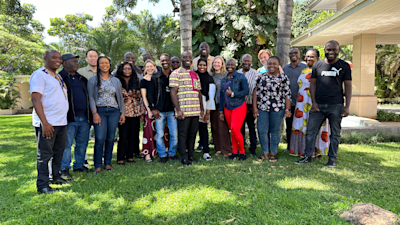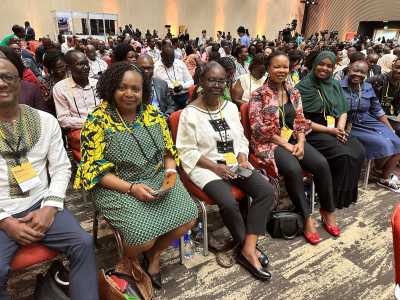Share with:

In a world where knowledge reigns supreme, literacy emerges as the essential vehicle propelling individuals, communities, and entire nations towards progress and prosperity. September 8th, celebrated as International Literacy Day, stands as a powerful reminder that literacy is not a mere privilege, it is an undeniable human right. As we mark this day, it becomes crucial to acknowledge the profound link between International Literacy Day and the transformative "Shift the Power" movement in the realm of international development. At its core, literacy is the ability to read and write, but its impact extends far beyond the realm of decoding words on a page. Literacy serves as the key that unlocks opportunities, upholds principles of social justice, and empowers individuals to fully engage in society(opens in new window). It forms the solid foundation upon which educated citizens build their lives, careers, and communities. So, what is the connection between this celebration of literacy and the "Shift the Power" movement?
"Shift the Power" represents a resounding call for change within the development sector.(opens in new window) It challenges the conventional top-down approach, where international organisations and donors hold significant sway over development initiatives. Instead, it advocates for a more democratic, inclusive, and sustainable approach. Central to the "Shift the Power" movement is the idea of granting local communities, organisations, and individuals a say in shaping and implementing projects that directly impact their lives.
Numerous initiatives are actively advancing these ideals, such as the Reimagining INGOs system change process(opens in new window), the Pledge for Change(opens in new window), the Shift the Power Movement(opens in new window), and the Giving for Change Programme(opens in new window). More recently, the Foreign Commonwealth Development Office (FCDO)(opens in new window) in collaboration with Comic Relief launched a 10-year initiative called the Shifting the Power programme. This programme is designed to strengthen civil society in Ghana, Malawi, and Zambia(opens in new window) by leveraging locally led development principles.
The convergence between International Literacy Day and the fundamental tenets of the "Shift the Power" becomes evident when we consider their shared emphasis on empowerment and inclusivity. Both International Literacy Day and "Shift the Power" underscore the importance of providing individuals and communities with the tools and autonomy to shape their own destinies. They recognise that true progress can only be achieved when individuals have the ability to access knowledge, participate in decision making processes, and exercise agency over their lives. In this opinion piece, we will look into the compelling parallels that exist between these two important endeavours.
Empowering Local Communities: The Grameen Bank Model in Bangladesh
In the heart of Bangladesh, the Grameen Bank(opens in new window), an institution founded by the Nobel laureate Muhammad Yunus(opens in new window), stands as a beacon of hope for communities seeking empowerment through literacy. The Grameen Bank embarked on a pioneering journey by launching microfinance programmes(opens in new window) that prioritised financial literacy. Through these initiatives, impoverished individuals gain access to capital, which they used to kickstart small-scale businesses. However, what truly set this approach apart was its commitment to equipping borrowers with the knowledge to read and interpret financial documents and effectively manage their businesses. This fusion of financial empowerment and literacy enables individuals to break the shackles of poverty that had ensnared them for generations.
Capacity Development: The Synergy of Literacy and Entrepreneurship in Rwanda: In Rwanda, a remarkable synergy has emerged between literacy initiatives and entrepreneurship training. Local organisations, fortified by the support of international donors, have introduced programmes that transcend the conventional boundaries of reading and writing(opens in new window). These initiatives not only foster basic literacy skills but to dig into the realm of business acumen. Through the nurturing of dual skill sets, they enable individuals not only to secure meaningful employment but also to venture into entrepreneurship, thereby becoming active contributors to economic growth and ultimately achieving self-sufficiency.
Advocacy and Awareness: Local CSOs as Agents of Change: In various global south nations, grassroots-level civil society organisations (CSOs) have emerged as formidable champions of literacy and education. These local CSOs have harnessed the power of International Literacy Day as a platform to spotlight the critical importance of education within their communities(opens in new window). Their tireless efforts extend beyond mere awareness raising; they apply pressure on governments and international organisations to allocate more resources towards education. This advocacy, firmly grounded in local realities, aligns seamlessly with the "Shift the Power" philosophy, which seeks to amplify the voices of local communities in shaping policy decisions.
Inclusivity: Preserving Indigenous Languages and Cultures in Latin America: The observance of International Literacy Day(opens in new window) has catalysed initiatives aimed at preserving indigenous languages and cultures in Latin American countries such as Mexico and Peru(opens in new window). These programmes are thoughtfully tailored to cater to the unique needs of indigenous communities, respecting their languages, customs, and traditions. This approach not only fosters inclusivity but also reinforces the cultural identity of historically marginalised groups, reaffirming the richness and diversity of the region's heritage.
Monitoring and Evaluation: Community-Led Assessments in Sub-Saharan Africa: "Shift the Power" advocates for a shift in the dynamics of development project oversight. In regions like Sub-Saharan Africa, communities have taken active roles in assessing the effectiveness of literacy programmes(opens in new window). Through regular evaluations and feedback mechanisms, they have become integral stakeholders in programme adaptation, ensuring that initiatives align with local needs and resources are utilised efficiently. This approach empowers communities to hold development efforts accountable and ensures that they remain relevant and impactful.
Sustainability: Local Ownership in Southeast Asia: In Southeast Asia, the "Shift the Power" movement has spurred a shift in the ownership of development projects(opens in new window). Specifically in the context of literacy, this means that local communities have assumed responsibility for both operating and financing literacy programmes. These communities, by seizing control and leadership, guarantee the continued success of these initiatives long after external organisations have departed. This model embodies the essence of empowerment, as it fosters self-reliance and resilience within the communities themselves.
In conclusion, International Literacy Day goes beyond being a simple celebration of words and books; it represents a celebration of empowerment(opens in new window). It serves as a reminder that literacy acts as the key that can unlock doors to a brighter future, both for individuals and entire communities. Furthermore, it issues a compelling call to align our development efforts with the core principles of "Shift the Power." On this International Literacy Day, let us reaffirm our commitment to literacy as a transformative force for empowerment and a catalyst for a more equitable global community. Together, we can harness literacy as a potent instrument propelling us closer to the vision of "Shift the Power" within international development. Join us in December at The #ShiftThePower Global Summit(opens in new window), where we aim to bring together change-makers and trailblazers from around the globe and various sectors, including international development, philanthropy, and civil society.
About The Author
Charles Kojo Vandyck is a development practitioner and thought leader within the civil society sector in Africa. He is the Head, Capacity Development Unit at the West Africa Civil Society Institute (WACSI) based in Accra, Ghana. Charles is also a Trustee of INTRAC, an Advisory Board Member of Disrupt Development and a Core Team Member of the Reimagining INGOs (RINGO) initiative.


